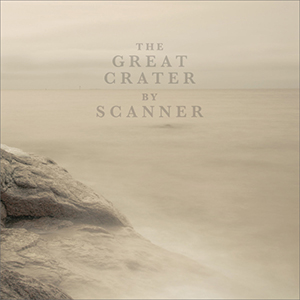 It is difficult to fathom that Robin Rimbaud’s Scanner project is nearing its 25th year, given the self-titled debut appeared in 1993. In that span of time he has become involved in a diverse array of artistic endeavors, from soundtracks to performance art, even to oblique pop music as a member of Githead, all of which stray far from his initial digital snooping and nod to the surveillance culture, which has only grown since. Conceptually, The Great Crater is a different beast entirely: a sonic examination of an odd phenomena occurring in Antarctica, and perfectly captures the wonder and potential dread of the event.
It is difficult to fathom that Robin Rimbaud’s Scanner project is nearing its 25th year, given the self-titled debut appeared in 1993. In that span of time he has become involved in a diverse array of artistic endeavors, from soundtracks to performance art, even to oblique pop music as a member of Githead, all of which stray far from his initial digital snooping and nod to the surveillance culture, which has only grown since. Conceptually, The Great Crater is a different beast entirely: a sonic examination of an odd phenomena occurring in Antarctica, and perfectly captures the wonder and potential dread of the event.
The titular crater is one that was first observed in 2014 and was assumed to be the result of a meteor impact.Closer inspections in subsequent years revealed it to be not a crater, but an expanding hole in the ice sheet, caused by pockets of water (from ice that had melted) underneath.The concern is that these pockets will expand, causing the ice sheet itself to disintegrate, with the potential of catastrophic side effects for the rest of the world.Given the nature of this incident, its physical appearance, the possible cause by humanity’s impact on the ecosystem, and its potential for wider reaching damages, it makes a unique theme for a widely varying electronic composition.
Rimbaud does an amazing job creating sounds that approximate these physical events.Rather than just utilizing field recordings of similar phenomena, it seems as if he was able to capture these sounds and images just with processing and modular synthesis.Opening "Cast to the Bottom" demonstrates this from its opening moments:massive rumbles like far off ice cracking is peppered with wet synth pulsations, creating a slushy introduction that he then casts layers of frigid, shimmering electronic space."Underwater Lake" sees him conjuring some quiet, light passages of synthesizer, withoccasional rumbles low in the mix.The tasteful amount of processing done gives the whole piece a distinctly aquatic sound, somewhat submerged but clear enough to be fully appreciated.
Later on, "Katabatic Wind" drifts in slowly via shimmery passages of peaceful sound.Even though there is an airy quality to the mix, Rimbaud blends in some echoing, sonar like notes that cluster together in the form of rudimentary, yet beautiful melodies."Lakes Under Lakes" is another slow moving piece, largely centered around a blend of string-like tones that are tinged with just the right amount of dissonance.A composition such as "Forming Circuits" stands out as captures him playing around with a more distinct sense rhythm.Built upon an insistent pulse that could almost be extrapolated from a 1990s house record, he adds some static crunch to take things in a different direction.
The lengthy "The Scar" is one of the moments on The Great Crater in which Rimbaud takes a more clearly composed approach to the sound.Big, droning low end is blended with eerie passages.With the addition of some big, far off crashes and a slowly expanding dynamic, he builds the piece to a dramatic, almost orchestral like conclusion that works perfectly."Strange Circles" has a sequenced-like melody from the opening moments that he builds upon throughout.The added electronic bits that come in and out do lend an almost 1970s science documentary feel to the proceedings, but Rimbaud is careful to rein things in before they get too far into new age territory.
There is undoubtedly a bleakness that runs throughout The Great Crater, no doubt to capture the potential danger of this event, but also our hand in creating it.The sound itself, however, is far more gorgeous than simple darkness though.Rimbaud’s ability to capture such non-musical events and themes via electronics is impeccable, and it is through that beauty that he injects a bit of hope into what otherwise seems like a grim situation.Regardless of the ecological impact or implications, however, The Great Crater is unquestionably a compelling and fascinating record that further cements Rimbaud’s legacy as a multi-talented and peerless, diverse composer.
samples:
 
Read More

